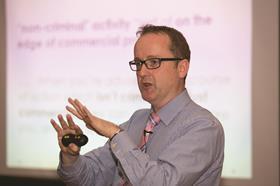Even where the motivations of clients and funders are altruistic, lawyers should 'exercise independent judgement', report for LSB states.
Lawyers should be cautious about acting in crowd-funded legal actions aimed at changing government or corporate policy, according to a major study on ethical risks published by the super-regulator. Such actions could become ‘the inversion of SLAPPs’ (strategic lawsuits against public participation), the study warns - and potentially just as damaging to the rule of law.
Participation in SLAPPs is one of several examples given by authors Professor Richard Moorhead, Professor Steven Vaughan and Kenta Tsuda of Exeter and London universities in a report for the Legal Services Board on legal professional conduct which could undermine the rule of law. Other examples include:

- Discriminating against potential clients
- Representing likely wrongdoers in a way that supports their continued wrongdoing
- Repeated silencing of claimants, for example through the misuse of non-disclosure agreements
- Facilitating ‘creative compliance with the law’
As an example of ‘inversion of SLAPPs’, the report cites The People’s Lawyers case against the government over coronavirus-related policies which the High Court eventually found to be ‘totally without merit’.
The development of crowdfunded ltigation ’heightens the risk… of suits that, in funders’ eyes, offer apparent public interest benefits, but are simultaneously meritless as a legal matter’, the authors state. The mere lack of an improper motive in bringing a meritless claim ’would not render it unproblematic’, the authors observe, as such claims may waste judicial time or drive unwarranted settlements.
’Even where the motivations of clients and third-party funders are altruistic, duties to the rule of law necessitate that lawyers exercise independent judgement on them,' the report concludes. ’
Overall, the authors say that their analysis of ethical risks finds that ’lawyers are sometimes too inclined to engage in professionally questionable, and potentially even illegal, actions without fully reflecting on the legal rules and interests engaged.’
Publishing the report, LSB chief executive Matthew Hill hinted at a more activist approach by regulators. He said the research ’gives us a greater understanding of the importance of the rule of law in underpinning rules and guidance for the progession, and builds on our evidence base for how the profession can target negative behaviours.’



























10 Readers' comments